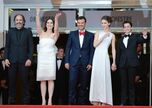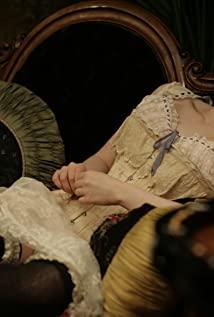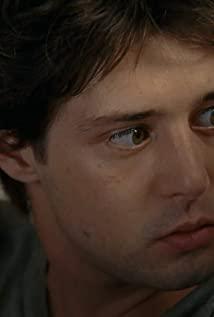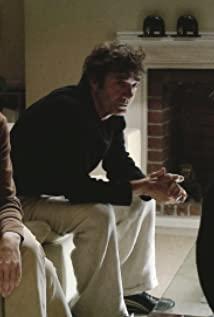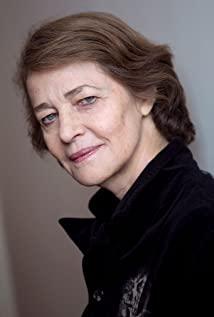In movies, mirror images are a frequent element. Elizabeth looked at the mirror with lipstick before the date on the first night, the mirror in the room when she met George for the first time in the hotel, and the mirror in the restaurant when she met the lawyer man for the first time. The glass window, the mirror when talking to her mother, the mirror when brushing her teeth, the mirror when she had sex with George, the mirror when her brother plucked his armpit hair, the mirror when she jumped up after George's sudden death - mirrors are everywhere in the movie .
In addition to the mirror image formed by "mirrors", there are also mirror images formed by images in the film. For example, Isabella's first night, her self was stripped from her body and looked at her, forming a pair of mirror images. The double life symbolized by Sabella and Leah (Isabella's pseudonym), and the mirrored composition at the end of the film when Isabella and George's wife lie face to face in bed.
Why is Ou Rong so obsessed with mirror images here?
The "mirror stage" theory is Jacques Lacan's theory of the self and the other. Before the "mirror stage", young children could not recognize the integrity of their bodies through self-perception. They thought that the self and the world were mixed together, so when they looked in the mirror, they would not feel that the mirror image of the mirror was their own. Only after the "mirror phase" will they separate "I" from the world and realize the difference between "I" and others. But to confuse the mirror image of seeing with the self is a misunderstanding. After the mirror stage, the subject constructs the self based on the perception of the "I" of the closest other people (similar to the role of a mirror) - but in fact, both the "I" in the mirror and the "I" in the eyes of others are affected by it. The "self" of "the other's gaze" is constructed. The true self can never emerge.
Simply put, the world is constructed by a series of ethics, rules, and languages, and when people live in it, the process of knowing oneself is always limited by the "other".
Therefore, it can be said that the main line of this film is Isabella's reconstruction of herself through aided dating .
From the dialogue between Isabella and her brother at the beginning of the film, we can know that they come from a family where sex is not fully accepted, and "don't tell mom" has become a phrase throughout the film, so when Isabella confronts When she wears lipstick in the mirror, she struggles to get rid of " mom is watching you" and construct herself for love and dating
On the next night, her ego was stripped from her body and looked down at herself from a distance.
Here, Isabella's first scrutiny attitude towards herself - almost no foreplay, almost unilateral lust - she realizes that there is no love between them, so her previous efforts were in vain Now, she is not a free subject who can resist her mother's control with love, and her ego is still in a state of repression, so she returned home disheartened and started the next step.
After turning seventeen, as in the lyrics of the BGM, "I'm not that little girl anymore", Isabella ended her vacation and saw her boyfriend in the car, without looking back, and in the next shot , what we saw was already the brand new Isabella, or rather, what we saw was already Leah - she was wearing a waist skirt, stockings, high heels, quite mature - she went to find journey of self.
The first time she wants to meet the old man George, who is different in age from her, here, the mirror appears again, we see that she is nervous, restrained, but still calm.
The second time she met a lawyer man who had a bizarre fetish (watching the other party touch and ejaculate) and threatened to default, this time we saw her reflection on the subway glass window was disappointed and resentful.
So far, the mirror image mainly expresses Isabella, that is, Leah's frustration in the process of voluntary assistance, and also shows that she is breaking away from the shy, restrained, and weak self in the past - this breaking and rebuilding. The process is painful but meaningful.
Next, the turning point comes when she reunites with George, whose relationship is secret but spills over in a theater encounter, intruding into their private lives and making their relationship different, intimate and alienating, Yi Sabella seemed to be paying special attention to George, and when George asked, "Have you seen anyone else?" in the subsequent meeting, please note that George also has a mirror image here, as if two men were asking her questions at the same time.
This seemed to remind her of the multiple lives she was living, and it also implied that George began to have possessiveness towards her, which is the bud of love outside of sex, so she began to meet George more frequently, and the relationship between the two It keeps heating up - we can also see it in the way they have sex, George respects her, is the most tender, he caresses, he gives, their sex is shared, two-way, not one party's ejaculation, which It's also why in the end George and Isabella's relationship was one of love in my opinion.
So at this stage, Isabella in the mirror is happy, she even takes the initiative to wipe off the mist on the glass door of the bathroom and observe herself carefully and proudly - she has control over the construction of herself.
But it didn't last long, George died suddenly, and we saw Isabella jumping out of bed in a panic in the mirror. She didn't even have a chance to look at him, so she had to leave the scene in a panic.
Does she really have "love" for him? If so, why didn't she even have a chance to stay to mourn him and organize his remains? Here, Isabella's ego comes to a standstill with the question of "love." And her secret was soon exposed with the intervention of the police. She seems to be returning to her normal life, babysitting for others, going to young people's parties, having a boyfriend her age - but that's not what she wants. There are plastic penis in other people's homes, people at the party are having threesome senseless, and this boyfriend is just a tool she uses to try and fill the pain caused by George's departure (so sad), Ou Rong seems to be asking here: Are those sex with plastic cocks, sex with loveless people, more nobler than sex with Isabella and George? Are those couples who can't soothe each other, the random pairings of men and women at parties, more legitimate than Isabella and George?
The answer given by the movie is no.
Isabella and George's love is no less inferior and "dangerous" than any other kind of love. When the policewoman asked Isabella if she would do this again in the future, Isabella said she didn't know, it was just an experience. But it was a dangerous experience, the policewoman said, and Isabella lowered her eyes, noncommittal, and said that George was the most tender, and he caressed me. When George talked about his daughter and asked about Isabella's father, Isabella only asked "Are you a good husband?" In Isabella's heart, she did not want to regard George as a good husband. The fathers, but put him in the role of "husband". When the psychiatrist asked Isabella George if she was the age of her father, Isabella sneered - many people will think of Isabella like a psychiatrist Bella's love for George is regarded as compensation for his father's love after his father leaves, but Ou Rong, or Isabella's attitude towards this, is disdainful - Isabella and George's love is the same as other loves, It happens naturally, there is no special reason, it is just pure love, not a substitute for family affection, a supplement.
However, here, Isabella still has not completed the pursuit of self and the pursuit of love (I think the two complement each other), she said that she felt that she killed George.
It seems that Ou Rong helped her - George's wife appeared. She said she and George were the same age as Isabella when they met, and they lay down face to face, forming a mirror image.
And, at the end of the film, Isabella wakes up, and what we see is her in the mirror, and George's wife has left, or perhaps never appeared. Here Ou Rong seems to be intentionally telling us that the two of them are one. Isabella was George's wife and accompanied George from the age of 17 until death of old age. Their relationship wasn't a sex trade, and George's death wasn't a sex trade, but a death in love. Here, she completed her love and saw her complete self in the mirror.
Therefore, in the whole film, it can be said that Isabella completed the reconstruction of herself through marginal love.
View more about Young & Beautiful reviews






